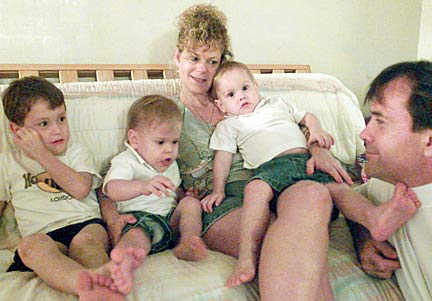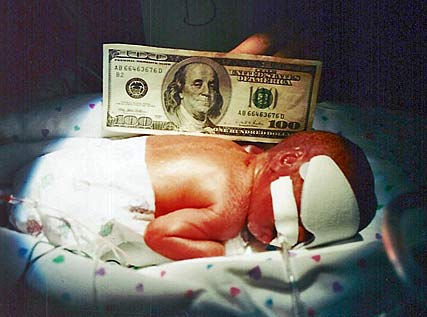
|
Born on the edge
A Kaneohe couple's three sons
were each born early, but
survived and now thrive
The premature births of their three sons with life-threatening complications, surgeries and months in the hospital are a painful memory for Donna and Rory Otto of Kaneohe.
They planned their pregnancies and she was conscientious about getting prenatal care, good nutrition and exercise, she said. "I did everything right."
WalkAmerica
The March of Dimes hosts a five-mile walk fund-raising event to combat premature births
» When: 7:30 a.m. Saturday
|
Their twin boys, Blake and Carsen, were born at 26 weeks on Nov. 26, 2002, each 12 inches long and weighing 1 pound, 12 ounces.
Despite a traumatic start in life, they're all doing well, Donna Otto said, expressing thanks for the medical advances that helped them survive and be healthy.
"Still to this day, I don't know why they were pre-term births," she said. "I've always been healthy and have no family history of that."
Although many factors are associated with premature births, "there are also a significant number of cases where there is no explicable cause," said Dr. Venkataraman Balaraman, neonatologist at Kapiolani Medical Center.
He said a lot of research is being done but no form of intervention has been shown to be effective.
Also, he said, "Over the last 15 years, we have kind of peaked on our technological support of these babies. So there is a big difference between a baby born at 24 weeks and a baby born at 25 weeks ... Just a few days can make a big difference."
Whatever is done technologically in the Neonatal Intensive Care Unit, Balaraman added, data show a nurturing family environment is critical for a premature baby's development and growth.
The Ottos, who own Island Collections, which manufactures koa items, were in shock when their first baby arrived so early.
"We always take for granted we're going to have a good pregnancy, a decent delivery and give birth to a beautiful, healthy baby," Donna Otto said. "That's what I was expecting."
She said she started having contractions about three days before Devin was born and medications failed to slow his birth.
"He was perfect on the outside but not on the inside," she said. He was given only a 50 percent chance of survival and they were told of possible life-long medical problems if he survived, she said.

Blake as an infant.
Devin was on oxygen for a month at home, took medication and for three years attended early intervention schools to make sure he would reach his developmental goals, she said.
Now Devin is in kindergarten and "doing very well," she said. "It's amazing. We're very lucky."
"After the horrors of all the NICU faded, we were getting kind of confident" about having another child, she said.
Her doctor said there was only a 10 to 15 percent chance of another premature birth so they planned a second pregnancy and again she did everything right, she said.
When they learned they were having twins, she said she knew that increased chances of a premature birth but thought it would be at about 32 weeks, "never 26 weeks.
"I barely made it to the hospital with them. I was dumbfounded. I couldn't believe it. Oh my God," she told herself, "this has happened again, times two."
Carsen was in the hospital 3 1/2 months and Blake for four months struggling with numerous infections, she said. Both had hernia surgery and Blake also had heart surgery.
She spent her days at the hospital. Her mother-in-law helped care for Devin and her husband ran their business in Halawa Valley and went to the hospital at night, she said.
The hospital staff became like family. "We love those people there. They're my heroes; like family," she said. "Especially the second time, it was comforting to be with people you knew and had a relationship with. But it was very difficult, especially to do it double."
The twins both went home on oxygen and medications and again the parents feared they would be handicapped.
However, they're going to Sultan School, which is part of Easter Seals, and "doing very well," Donna said. "They're behind (in development) but we're very confident they're going to reach goals and grow up to be normal healthy boys like their big brother."
Their medical insurance covered most of the costs, which totaled about $1 million per child, Donna said. "We were probably out of pocket a couple thousand dollars. We were so lucky, considering how much we could have paid, that's nuthin.'
"The NICU and whole preemie thing is kind of in our past now," she said. Surgery scars on the children are the only reminders, she said, "and if they get a cold, they're wheezier, probably more congested than the average kid." Sometimes she has to help Blake with a breathing treatment, she said.
A public health nurse checks on the children monthly to make sure they're healthy and reaching development goals, she said.
After her experience, she said, "I just feel very passionate about helping parents any way I can."
She's involved in forming a parent support group at Kapiolani as part of the March of Dimes' prematurity awareness campaign. The group will have a staff member to work with parents, she said.
"I'm hoping to be the parent that's been there that can be supportive in any way I can. Had I been able to see a kid that was born at 25 weeks like Devin and know he turned out normal, I would have loved that," she said.
[News] [Business] [Features] [Sports] [Editorial] [Do It Electric!]
[Classified Ads] [Search] [Subscribe] [Info] [Letter to Editor]
[Feedback]
